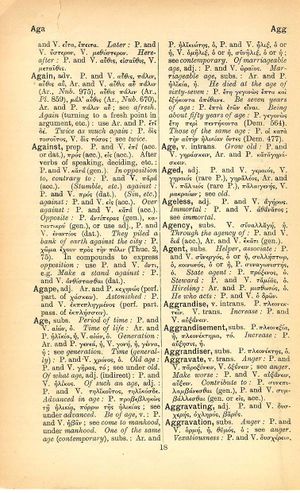against: Difference between revisions
κοινὴ γὰρ ἡ τύχη καὶ τὸ μέλλον ἀόρατον → fortune is common to all, the future is unknown | fortune is common to all and the future unknown | fate is common to all and the future unknown
(Woodhouse 2) |
(CSV3) |
||
| Line 1: | Line 1: | ||
{{ | {{Woodhouse1 | ||
| | |Text=[[File:woodhouse_18.jpg|thumb|link={{filepath:woodhouse_18.jpg}}]]'''prep.''' | ||
P. and V. ἐπί (acc. or dat.), [[πρός]] (acc.), εἰς (acc.). | |||
<b class="b2">After verbs of speaking, deciding, etc.</b>: P. and V. [[κατά]] (gen.). | |||
<b class="b2">In opposition to, contrary to</b>: P. and V. [[παρά]] (acc.). | |||
(<b class="b2">Stumble, etc.</b>) <b class="b2">against</b>: P. and V. [[πρός]] (dat.). | |||
(<b class="b2">Sin, etc.</b>) <b class="b2">against</b>: P. and V. εἰς (acc.). | |||
<b class="b2">Over against</b>: P. and V. [[κατά]] (acc.). | |||
<b class="b2">Opposite</b>: P. ἀντίπερας (gen.), [[καταντικρύ]] (gen.), or use adj., P. and V. [[ἐναντίος]] (dat.). | |||
<b class="b2">They piled a bank of earth against the city</b>: P. [[χῶμα]] ἔχουν πρὸς τὴν πόλιν (Thuc. 2, 75). | |||
<b class="b2">In compounds to express opposition</b>: use P. and V. ἀντι, e. g. | |||
<b class="b2">Make a stand against</b>: P. and V. ἀνθίστασθαι (dat.). | |||
}} | }} | ||
Revision as of 09:20, 21 July 2017
English > Greek (Woodhouse)
prep.
P. and V. ἐπί (acc. or dat.), πρός (acc.), εἰς (acc.).
After verbs of speaking, deciding, etc.: P. and V. κατά (gen.).
In opposition to, contrary to: P. and V. παρά (acc.).
(Stumble, etc.) against: P. and V. πρός (dat.).
(Sin, etc.) against: P. and V. εἰς (acc.).
Over against: P. and V. κατά (acc.).
Opposite: P. ἀντίπερας (gen.), καταντικρύ (gen.), or use adj., P. and V. ἐναντίος (dat.).
They piled a bank of earth against the city: P. χῶμα ἔχουν πρὸς τὴν πόλιν (Thuc. 2, 75).
In compounds to express opposition: use P. and V. ἀντι, e. g.
Make a stand against: P. and V. ἀνθίστασθαι (dat.).

